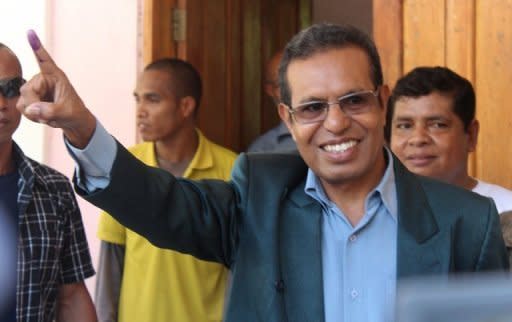Former guerrilla Ruak elected East Timor president
Former guerrilla Taur Matan Ruak has won East Timor's presidential run-off by a wide margin, preliminary results showed Tuesday, in a pivotal year for the nation almost a decade after independence. Ruak, who had campaigned in military fatigues to highlight his role in the fight against Indonesian occupation, won 61.23 percent of the vote, according to figures from the elections secretariat, which organised Monday's polls His challenger Francisco Guterres -- also a hero in the independence struggle and popularly known by his nom de guerre "Lu Olo" -- trailed with 38.77 percent, according to the count. All the results have been counted but they must be examined by the court of appeals before they are officially announced. "We are very much elevated by the result, by the current outcome," said Ruak's spokesman Fidelis Magalhaes. "We expect to see some changes (in the final count), minor, probably one or two percentage points, but without a clear swing or fluctuation of points," he added. If confirmed, Ruak, also a former defence chief, will become the leader of the impoverished and oil-dependent country, replacing Nobel Peace Prize winner Jose Ramos-Horta, who trailed in third place in the first round on March 17. The streets of Dili were quiet Tuesday, with no sign of celebration, unlike the campaigning when hundreds of supporters from both sides sped past on motorcyles and buses, flashing victory signs. An international poll observer said the wide margin left no room for dispute over the results. "If there was a close result there could have been some quarrelling, and while it's not a landslide, this is a clear victory," said Rui Feijo, an election observer and researcher from Portugal's Coimbra University. The vote marked the first in a series of key events in the chronically unstable country, still traumatised by Indonesia's brutal 24-year occupation which ended with a 1999 referendum for independence. In May, East Timor will celebrate 10 years of independence, which came after three years of United Nations administration. On July 7, voters will choose a new government in a general election. The UN has said peacekeepers stationed in East Timor since 1999 would pull out as planned by the end of 2012 if both elections were peaceful. A spokesman for UN Secretary General Ban Ki-moon said Monday's vote had taken place in a "peaceful and orderly manner". While Ruak, 55, sought to burnish military credentials throughout the campaign, Lu Olo, 57, has shed his guerrilla image, earning a law degree and campaigning in a suit and tie. Ruak, who resigned as defence chief late last year to run for president, has vowed to introduce mandatory military service if elected. He has been accused by the United Nations of involvement in illegal weapons transfers in 2006 when rioting and factional fighting left the nation on the brink of civil war. However, no attempts have been made to prosecute him. While the presidency is largely ceremonial, it has enjoyed a high profile under Ramos-Horta. Among East Timor's many teething problems as a fledgling nation is its heavy reliance on energy reserves, which account for around 90 percent of state revenues. East Timor is labelled by the International Monetary Fund as the "most oil-dependent economy in the world", relying on a petroleum fund that reached $9.3 billion last year. More than 458,000 Timorese, or 73 percent of more than 627,000 registered voters, went to the polls Monday, the elections secretariat said.




